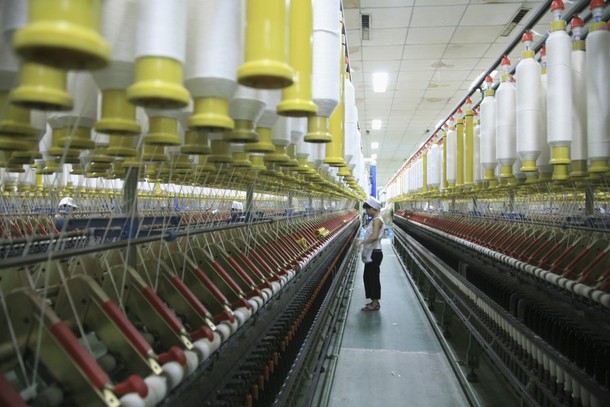

Photo by: David H. Seymour
Manufacturing, which now ranks ahead of agriculture as an income earner, has increased rapidly owing to a vigorous policy of industrialization. However, Greek industry must rely on imports for its raw materials, machinery, parts, and fuel. Greece has only a rudimentary iron and steel industry and does not manufacture basic transport equipment, such as cars and trucks. Industry is concentrated in the Athens area.
Chief industries in 1995 accounted for the following proportions of manufacturing's share of the GDP: food, beverages and tobacco, 25%; metals and metals manufactures, machinery and electrical goods, 17%; chemicals, 13%; textiles, 18%; nonmetallic minerals, 6%; and transport equipment, 4.3%. Although the government controls certain basic industries, such as electric power and petroleum refining, most industry is privately owned. The portion of government-controlled industries is declining as the state divests itself of substantial control over key holdings such as Olympic Airways and the telecommunications company, OTE.
The industrial sector accounted for 13% of GDP in 2001, and it grew by 5% in 2000. Food production increased by 3.6% in 2000, and the production of chemicals rose by 1.7%. Due to an increase in housing construction, cement production rose 1.5%, and construction as a whole rose 9% in 2001. High technology equipment is a growth sector, as is the production of electrical machinery (up 18.3% in 2000), and office machinery and computers (up 13.6% in 2000). Greek ship owners committed to invest close to $2 billion in new shipbuilding in 2002. Industrial production as a whole was forecast to grow 3.8% in 2003.
Chief industries in 1995 accounted for the following proportions of manufacturing's share of the GDP: food, beverages and tobacco, 25%; metals and metals manufactures, machinery and electrical goods, 17%; chemicals, 13%; textiles, 18%; nonmetallic minerals, 6%; and transport equipment, 4.3%. Although the government controls certain basic industries, such as electric power and petroleum refining, most industry is privately owned. The portion of government-controlled industries is declining as the state divests itself of substantial control over key holdings such as Olympic Airways and the telecommunications company, OTE.
The industrial sector accounted for 13% of GDP in 2001, and it grew by 5% in 2000. Food production increased by 3.6% in 2000, and the production of chemicals rose by 1.7%. Due to an increase in housing construction, cement production rose 1.5%, and construction as a whole rose 9% in 2001. High technology equipment is a growth sector, as is the production of electrical machinery (up 18.3% in 2000), and office machinery and computers (up 13.6% in 2000). Greek ship owners committed to invest close to $2 billion in new shipbuilding in 2002. Industrial production as a whole was forecast to grow 3.8% in 2003.
Read more: http://www.nationsencyclopedia.com/Europe/Greece-INDUSTRY.html#ixzz2rI42R7cX